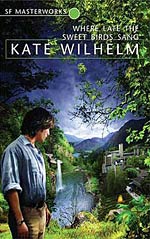
![]() jfrantz
jfrantz
7/1/2012
![]()
The world is at war and politicians are leading everyone to a pit of chaos and destruction. Fortunately a very skilled family of scientists sees the writing on the wall and decides to take action to save their family and loved ones. Of course they respond to the challenge of ensuring their survival by turning to their very unique skill set, namely, the cloning of organic tissue.
The copy from the back cover of my copy promised it would be "one of the best treatments of cloning in SF" and I'm here to tell you that statement wasn't far off the mark.
A book in three parts and an epilogue
Like A Canticle for Leibowitz, WLSBS was written in three parts, with significant lapses of time between them and just as with ACL, the story in each of these parts can be wildly different from one part to the next. In this case, it meant we heard the story of a different person with different problems and while I didn't love it right away, by the time I reached Part III they had all coalesced and the whole turned out a great deal better than the sum of its parts. Part I and II were okay but felt unfinished. Part III was magnificent. Mark turns out to be one of the most successfully seriously grave and seriously funny tricksters I've read in a long while. I wish the epilogue had been edited out but I don' want to give up too much so I'll just say this book builds up steam like a locomotive only to be derailed by a penny on the track some kid put there to be funny.
An American story
A © of 1976 means everything for WLSBS. It places it immediately after the passage of numerous federal environmental policies like the Clean Air Act, the Clean Water Act, National Environmental Policy Act, Endangered Species Act and the Safe Drinking Water Act to name just a few. By this time, Silent Spring had been a part of the national consciousness for over 1o years. Aldo Leopold had taught us to "think like a mountain". America had a renewed interest keeping our wilderness wild, keeping it clean and making sure our children wouldn't forget the sound of birds singing. We also had a renewed interest in transcendental thinking about the environment. Around the time Wilhelm was writing this book, Environmental NGO's were enjoying some of their highest membership and charitable giving they would see for many, many years. By 1976 the Hugos had apparently turned their attention from the inky-black sky to our inky-green forests.
I caught this in WLSBS in a couple of ways but most prevalently in Mark's character, his worries and his actions. Mark thrived in the wild. He loved the forest and the river and not only for his ability to seek solitude there. It was a place for renewal and becoming one with the place he lived. He was like a Henry David Thoreau of the future. He needed the wild if he wanted to survive and he was trying his damnedest to remind the others that they needed it too. When he scouted the remains of the big cities, he felt oppressed and not just for the symbol of how far civilization had fallen. The cities epitomized the artificiality of the people in the valley.
But he also understood that there was something in the forest that he could never have and respected and feared it. He knew the forest needed to exist on its own inaccessible to civilization and that it helps keep our sanity. And in all these ways it seemed to me a book of its time. Well, maybe this is just a case of me cramming two ill-fitting and unrelated puzzle pieces together, but if Wilhelm wasn't intentionally saying it, I'd like to believe I'm not the only one to have picked up on it.
Recommendation
This is an apocalyptic/post-apocalyptic novel but it is quite refreshingly removed from the usual tropes about urban survival, fear of the other, contagion or The Bomb. Of course there has been fallout and everyone is worried about survival but the idea that a group of well-stocked and able doctors would worry more about the survival of their children's children's children was something new and different and cool. I didn't feel the actual storytelling offered much to get excited about, but the concept alone carried it pretty far.
http://hugoenduranceproject.blogspot.com/2012/07/where-late-sweet-birds-sang.html